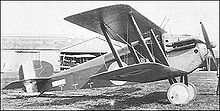James William Pearson
James William Pearson | |
|---|---|
 James William Pearson, 1918 | |
| Born | April 2, 1895 Bridgeport, Connecticut, USA |
| Died | January 26, 1993 (aged 97) Montclair, New Jersey, USA |
| Allegiance | |
| Service | Royal Air Force (United Kingdom) |
| Rank | Captain |
| Unit | Royal Air Force |
| Battles / wars | |
| Awards | British Distinguished Flying Cross, French Croix de Guerre |
| Other work | Longest surviving American ace of World War I |
Captain James William Pearson was an American World War I flying ace credited with twelve aerial victories while flying for the British Royal Air Force.[1]
Early life
[edit]Pearson's home town was Nutley, New Jersey, despite being born in Connecticut.[2]
World War I
[edit]
Pearson was promoted to 2nd lieutenant (temporarily) in October 1917.[1]
He was assigned to No. 23 Squadron RFC at Bertangles, which originally operated Spads. They later re-equipped with Sopwith Dolphins, and Pearson began to score confirmed victories of enemy aircraft.[2] Between 30 May and 1 November 1918, he destroyed six enemy planes (one of which was a joint victory with Harry Compton) and drove six others down out of control.[1]
Aerial victories
[edit]| No. | Date/time | Foe | Result | Location | Notes |
|---|---|---|---|---|---|
| 1 | 30 May 1918 @ 1045 hours | Albatros reconnaissance plane | Driven down out of control | South of Albert | Victory shared with another pilot |
| 2 | 3 June 1918 @ 1740 hours | Pfalz D.III fighter | Set afire and destroyed | Montdidier | |
| 3 | 1 July 1918 @ 1135 hours | Albatros D.V fighter | Destroyed | Hangest | |
| 4 | 1 July 1918 @ 1140 hours | Albatros D.V fighter | Driven down out of control | Hangest | |
| 5 | 1 August 1918 @ 0720 hours | Halberstadt reconnaissance plane | Set afire and destroyed | Caix-Harbionnieres | |
| 6 | 1 August 1918 @ 0740 hours | Pfalz D.III fighter | Driven down out of control | Warfusée | |
| 7 | 18 September 1918 @ 1215 hours | Fokker D.VII fighter | Set afire and destroyed | Lihaucourt | |
| 8 | 18 September 1918 @ 1215 hours | Fokker D.VII fighter | Driven down out of control | Lihaucourt | |
| 9 | 28 October 1918 @ 1130 hours | Fokker D.VII fighter | Driven down out of control | Bois de Nouvion | |
| 10 | 28 October 1918 @ 1130 hours | Fokker D.VII fighter | Destroyed | Bois de Nouvion | |
| 11 | 29 October 1918 @ 1300 hours | Halberstadt reconnaissance plane | Driven down out of control | Northeast of Landrecis | |
| 12 | 1 November 1918 @ 1210 hours | DFW reconnaissance plane | Destroyed | Petit Bart | Victory shared with Harry Compton and another pilot[1] |
Postwar
[edit]Pearson founded the J. W. Pearson Textile Company, from which he retired in 1960. Upon his death in 1993, it was realized that Pearson was the last surviving American ace from World War I.[2]
Honors and awards
[edit]Distinguished Flying Cross (DFC)
Lieut. (A./Capt.) James William Pearson. (FRANCE)
On 26 October, while leading a patrol, this officer observed a formation of enemy scouts. Diving to the attack, he engaged one and drove it down out of control. He then attacked a second, which he drove down to crash. In all he has accounted for seven enemy aircraft, setting at all times a fine example of skill and courageous determination.[3]
See also
[edit]References
[edit]Bibliography
[edit]- American Aces of World War 1 Harry Dempsey. Osprey Publishing, 2001. ISBN 1-84176-375-6, ISBN 978-1-84176-375-0.
- Over the Front: A Complete Record of the Fighter Aces and Units of the United States and French Air Services, 1914–1918 Norman L. R. Franks, Frank W. Bailey. Grub Street, 1992. ISBN 0-948817-54-2, ISBN 978-0-948817-54-0.
